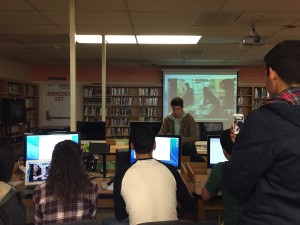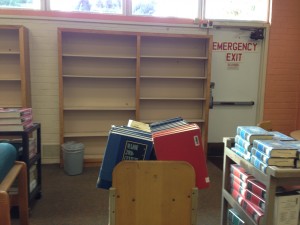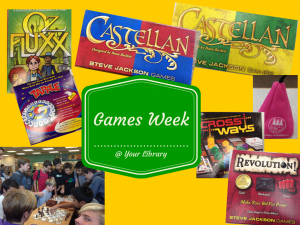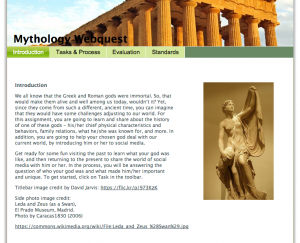
I was very fortunate last week to attend School Library Journal’s annual invitational leadership summit. This year’s summit took place October 25 – 27 in St. Paul, MN. It was truly a teacher librarian’s dream come true. This mini-conference brings together approximately 200 of the most cutting edge, enthusiastic leaders in the school library field from across the nation. Had we simply gotten together for the weekend without any of the formal sessions, I would have come away with second-to-none new knowledge and ideas through the networking with friends from all over the country I have met before live or via my social media personal learning network (PLN) and new friends I made there for the first time. While the networking was incredible, we did, of course, also have an amazing collection of sessions that added to my expertise as a school librarian, inspired me to work smarter to better serve my students and staff, and supported our district’s top priority of Common Core State Standards (CCSS) for professional development this year.
As a teacher librarian, I support the needs of CCSS in many ways. Below are just a few of the key ways, along with some related takeaways from the summit.
Research Support
Although research is not isolated as its own topic in the CCSS, even a cursory reading makes clear that it is a key element in the Writing standards. In fact, research is one of the highest frequency words in all the standards. I help students learn good research skills every day through class lessons and one-on-one help on how to find, evaluate, cite, and use research sources; pathfinders I provide curating quality resources on topics being researched; and online tutorials on the library website.
One of the outstanding panels at the summit, the Mooresville Graded School District (MGSD) group from North Carolina, led by Dr. Mark Edwards, National Superintendent of the Year, shared the district’s experience transitioning to a 1:1 laptop model. The librarians play a pivotal role in supporting this model. Five of the district’s eight librarians (the district has one credentialed librarian and one assistant at every school and two librarians at the high school) participated in the panel. We were all inspired hearing how they fulfill their “every child, every day” motto with engaging teaching, resources, and curriculum. I have ordered and plan to share Edwards’ book, Every Child. Every Day: A Digital Conversion Model for Student Achievement, with our district. On the research topic, the librarians shared the importance of having a research method that is scaffolded from the early grades through high school. The research model MGSD uses is the extremely well-respected “Big 6” strategy. I actually implemented this model when I was a middle school teacher librarian in my previous district, and I continue to share elements of it with classes that visit the Mira Costa Library, but I have never felt like I have enough teaching time during class lessons to fully implement it at Mira Costa. Listening to the MGSD librarian panel is making me rethink my priorities; I want to move to implement it in a more formal, explicit way at Mira Costa to help students better understand research as a process of steps.
Another session at the summit, delivered by Jole Seroff and Tasha Bergson-Michelson, librarians at Castilleja School in Palo Alto, inspired us to ponder and get in touch with our own research techniques that we exercise tacitly, and to model those techniques for students. For example, when students begin research on a topic for which they have little or no background knowledge, we can help them build stepping stones to good search terms and questions by having them scan introductory texts to find keywords to search for and questions to explore as they move forward.
Reading and Reading Materials Support
Reading both informational and literary texts are important components of the CCSS. One vital role I play in the library is building a culture of reading. By developing a collection of quality literature and fiction, literary nonfiction, and informational text, I provide appropriate reading materials for our students curricular needs. And, equally important, I promote reading books students want to read, since I know that the more students read and get to read about what interests them, the better readers they become, and the more prior knowledge they will build and have available to apply to curricular texts.
I attended a pre-summit session led by Deborah Ford from Junior Library Guild that helped me not just with ideas for new titles to enrich our collection, but, more importantly for me, with strategies to weed the many old and outdated books our library owns. I have not been able to keep up with this very important task at Mira Costa. I plan to make this a priority this year and at least begin an extensive weeding project which will make the remaining newer books more visible and accessible to our students.
I also benefited from visiting with a variety of vendors that supply materials that could better support our collection. I am currently working on creating an order with Mackin, one of the vendors, to purchase digital, downloadable audiobooks for all our core English literature. I will also be taking advantage of exciting new offerings from some of the other vendors, and I appreciate discount opportunities for summit attendees provided by several of the vendors.
Supporting use of digital media
Students’ use of digital media plays another important role in the CCSS. I support our students by helping them use digital media appropriately and effectively to learn and to create products to demonstrate mastery. This Fall, we significantly increased our library’s digital offerings by adding EBSCO’s Academic ebook collection of more than 130,000 titles along with EBSCO’s Academic Search Premier database, giving us access to more than 4,600 academic journals. Another takeaway from the summit was ideas I can use for better promoting our new ebooks that are replacing outdated print titles. Some schools, for example, are using old VCR cases to “stand in” for ebooks on the library shelves. These cases include ebook titles and QR codes to allow students to access the ebooks. I will be working this year on a variety of strategies to promote the rich electronic sources we now have from EBSCO and other vendors.
And so much more
This is just a few of my early reflections of my experiences at the summit. I know I will be able to take advantage of many more of my experiences there to enhance the library program this year.
And, as I mentioned at the beginning of this posting, the networking was incredible. Here are just a few examples:
- I got to see Michelle Luhtala and Shannon Miller, two members of our#SWVBC (Somewhat Virtual Book Club) and plan some strategies for our ongoing book club meetings.
- I connected with Joyce Valenza, Andy Plemmons, and Deb Shorganizers of the Global TL network, and got to exchange ideas about building meaningful global connections for our students. At Joyce’s suggestion, I am considering submitting a proposal to present about the Somewhat Virtual Book Club at the Global Education Online Conference in November.
- Andy was one of the people I recently got to know through my virtual PLN and had the pleasure of meeting in person for the first time at the summit. We also have in common that we both attended a Google Teacher Academy and became a Google Certified Teacher last summer, and we exchanged ideas about what we learned at our academies, his in Atlanta, and mine in Mountain View.
- Another librarian I was honored to meet live for the first time at the summit was Michelle Colte, School Library Journal‘s School Librarian of the Year, coming all the way from Hawaii. During the weekend, she and Elissa Malespina, another PLN friend, filled me in on their Virtual Poetry Summit plans for National Poetry Month in April, and invited me to join. I plan to recruit Mira Costa students to participate.
- Fellow California School Library Association friends Sue Heraper and Liz Dodds and I had a chance to connect live and exchange ideas we can use to enrich our association’s activities.
Here is a wonderful video created by Capstone, another of the vendors, we saw during the opening of the summit that shows the vital role of libraries and trained librarians supporting our students’ engaged learning:
Many thanks to School Library Journal and all the organizers, exhibitors, and presenters who made the summit possible.











